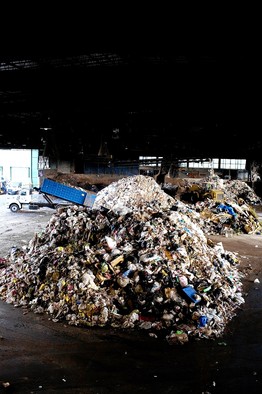Communities Aim to Build on San Francisco Ban, but Some Businesses Object; a Fee for Paper Sacks, Too
By VAUHINI VARA
The move to outlaw plastic shopping bags is spreading from San Francisco to other Bay Area communities, but the latest measures are rankling some shopkeepers and plastic manufacturers who say the bans go too far.
When San Francisco banned single-use plastic bags from big grocery stores in 2007, some dismissed the move as just another idiosyncrasy of the famously progressive city. Now, a number of neighboring local governments, including San Jose and Sunnyvale, are approving or considering bans of their own. The idea is to keep plastic bags from littering streets, jamming trash-processing machines and swimming in San Francisco Bay. The San Francisco ban has lowered plastic-bag waste in the city by 15% to 20%, according to the city’s trash and recycling contractor.
Encouraged by San Francisco’s example, these communities hope to take the bag ban one step further. Because paper bags have environmental problems of their own—trees and other resources are consumed to make them—some local governments are aiming to limit use of both plastic and paper, by banning plastic bags altogether and charging a nominal fee for paper ones. The goal is to persuade shoppers to start bringing reusable bags to stores.
The latest measures come in the wake of a well-publicized state bill that would have banned single-use plastic bags throughout California. The measure ultimately failed last year but attracted the attention of local governments that are now considering bans of their own. Another impetus is a new state requirement that cities in the Bay Area limit debris that passes into water bodies through storm drains.
Those developments “have motivated cities to move forward, in addition to many of them just wanting to do the right thing for the environment,” said Felicia Madsen, chief strategy officer at Save the Bay, an environmental group that advocates for plastic-bag bans.
In 2007, San Jose City Council member Kansen Chu visited his native Taiwan and noticed grocers charging customers for plastic bags. “I thought, ‘Wow, if governments in Taiwan can do it, why can’t we also implement something similar?’ ” he recalled.
But San Francisco’s controversial plastic-bag ban that year had mobilized plastics-industry lobbyists who wanted to keep other cities from adopting similar plans. Representatives of the American Chemistry Council began meeting with city officials in San Jose and elsewhere around the region to tout other options, like plastic-bag recycling.
Another group called the Save the Plastic Bag Coalition, made up of plastic-bag makers, took an unorthodox legal tack: It sued Oakland and other cities that had approved plastic-bag bans without first filing environmental-impact reports. By state law, cities must file such reports before making any decision that may adversely affect the environment, and the coalition argued that a plastic-bag ban qualified because it would boost the use of paper bags.
Hoping to avoid a lawsuit, San Jose paid a consultancy $140,000 to study the issue. The resulting report said both paper and plastic bags harm the environment.
“We took our time—a little too long by my measurement—but we did a solid environmental study and found that paper is really not very environmentally friendly, either,” Mr. Chu said. “So we said, ‘Well, maybe we should consider a limitation on the paper bag as well.”
The culmination of his efforts came in December, when San Jose’s city council approved a plastic-bag ban starting in January 2012, along with a 10-cent charge for each paper bag, which would rise to 25 cents after two years.
Other local governments are moving ahead with bans of their own. Marin County in January approved a ban. Palo Alto considering an expansion of its 2009 ban that currently is limited to a handful of supermarkets. And Sunnyvale is about to start compiling its own environmental-impact report, with the hope of approving a ban by year’s end. Other cities considering bans include Fremont and Daly City. Some of the cities are considering new fees for paper bags, ranging from five to 25 cents.
But the plastic industry said the measures will cause needless headaches. Tim Shestek, senior director of state affairs for the American Chemistry Council, said cities instead should promote plastic-recycling programs in grocery stores. He called that alternative consumer- and business-friendly because it would give consumers more choices and keeps their costs down, while helping plastic-bag makers and keeping more recycled plastic in circulation for businesses that use it.
“We’re doing all we can to hit those folks with the idea that this approach is really unnecessary and could have some significant unintended negative impacts,” Mr. Shestek said.
Environmentalists counter that the best solution would be to persuade more consumers switch to reusable cloth bags. “That’s the most environmentally friendly alternative,” said Ms. Madsen of Save the Bay. But she says the combination of a plastic-bag ban and fee for paper ones is a good initial step.
The transition could be tricky, however.
At San Jose grocery Zanotto’s, cashier Melissa Martinez anticipated contending with grumbling customers. “They like to be able to choose” between paper and plastic, she said, adding that some customers are stockpiling plastic bags ahead of the ban.
